- Sustainability TOP
- Environment
- Environmental Risk Prevention Measures
Environmental Risk Prevention Measures
Basic Approach
The Isuzu Group has set the Aspiration of pursuing safe and reliable operations and products as part of Isuzu Environmental Vision 2050. By strengthening our environmental management foundation and supplier engagement, we will work to prevent environmental risks.
| Isuzu Environmental Vision 2050 | 2030 Environmental Roadmap | |
|---|---|---|
| Aspiration | 2030 Challenge | Global Action |
Safe, reliable operations and products |
|
|
Initiatives
Promoting Water Resource Conservation
Understanding and Responding to Water-Related Risks
In recent years, climate change is increasing concern about the ability to secure water resources and about water-related risks such as flooding. Since FY2016, Isuzu has been using AQUEDUCT, a global water risk evaluation tool, to conduct surveys on water risks.
The surveys have confirmed that while Isuzu uses groundwater and tap water, there are no urgent issues related to water usage itself.
However, they have also revealed that geographic conditions could lead to operational risks and impacts on the supply chain due to flooding, drought, or water source depletion caused by extreme weather conditions such as heavy rainfall.
In light of these findings, we are advancing efforts to address water risks, taking into account operational and business risks, by reducing water resource consumption and mitigating these risks.
Building a Society Free of Water Stress
The Isuzu Group contributes to building a society free of water stress, where all people can have access to safe water without concern.
Isuzu Gives Water...for Life
Twenty-one Isuzu Group companies in Thailand are collaborating with Thailand's Department of Groundwater Resources and regional authorities on the Isuzu Gives Water...for Life project, which contributes to building a water-stress-free society.
The goals of the project are to install water treatment systems and provide access to drinkable water at schools in outlying areas of Thailand struggling with polluted water. Through the project, teachers and students learn how to manage and maintain the system so they are able to sustainably secure access to drinking water. Launched in 2013, the project held 44 events by March 2025.
In addition, from a carbon neutral perspective, solar panels have been installed on the roof of the buildings to provide clean energy for the electricity needed to operate the water purification facilities, which began operation in 2025.
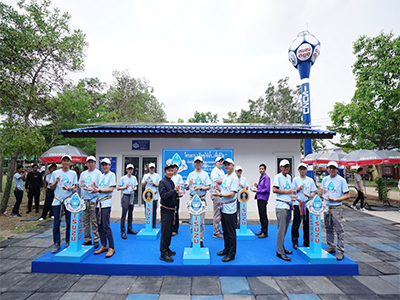
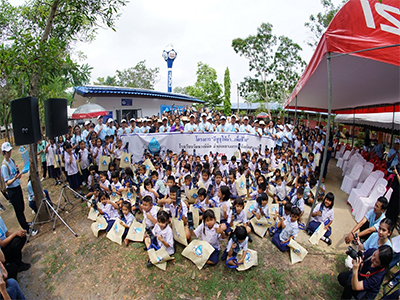
Isuzu Gives Water...for Life Project
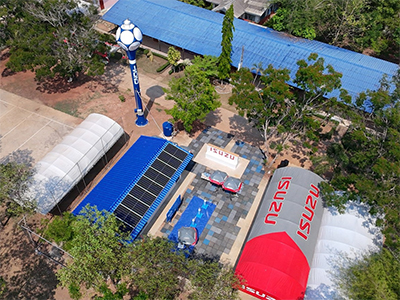
Solar panels for water purification facilities
Thorough Chemical Substance Management
We take thorough measures to minimize the environmental risks associated with chemical substances used in our business activities and products. In FY2025, a halon leakage occurred in the Fujisawa area due to mishandling during fire extinguishing equipment inspection. Immediately after the occurrence, we immediately reported the incident to the relevant authorities, investigated the cause, and took measures to prevent recurrence.
Management of Chemicals Used in Business Activities
To reduce environmental risks and ensure employee safety associated with chemicals used in our business activities (such as paints and lubricants), we have established internal regulations that require advance applications for the use of new chemicals. These applications are reviewed based on laws such as the Chemical Substances Control Law*1, the Industrial Safety and Health Act, and the Poisonous and Deleterious Substances Control Act to determine the appropriateness of the chemicals’ use. Based on the results of these pre-screenings, necessary measures are implemented before using the chemicals.
In FY2025, we conducted pre-screening for 189 chemicals.
Additionally, we have created a database for the chemicals used at our business sites, which includes information on their chemical composition and usage amounts. We continuously register new information from advance applications and update the database accordingly to strengthen management. This database helps us properly report to the Pollutant Release and Transfer Register (PRTR)*2 under the Chemical Management*3, and ensures we stay compliant with amendments to environmental regulations including the Chemical Substances Control Law, the Industrial Safety and Health Act, the Poisonous and Deleterious Substances Control Act, and the Chemical Management. Furthermore, by referring to this database, we are actively working to reduce the use of harmful chemicals by shifting to environmentally friendly chemicals and revising our processes.
- *1Chemical Substances Control Law: A law concerning the examination and regulation of chemical substances and their manufacture.
- *2PRTR Law: A law concerning the Promotion of the Management of Chemical Substances.
- *3Chemical Management: Act on Confirmation, etc. of Release Amounts of Specific Chemical Substances in the Environment and Promotion of Improvements to the Management Thereof (Law concerning Pollutant Release and Transfer Register / PRTR)
Management of Chemicals Contained in Products
We take into consideration the chemicals contained in raw materials and components in the design and development stages and comply with the chemical regulations of various countries, including Japan's domestic laws, as well as the European REACH regulations, ELV directive, and the United States' TSCA. Isuzu has specified the chemicals that are prohibited or managed by Isuzu as part of the Isuzu Technical Standards considering national regulatory trends. These standards are applied to the raw materials and components used in our products.
We use the International Material Data System (IMDS), a global product substance information communication system for the automotive industry, to manage information about the chemicals contained in parts. We collect information from our business partners through IMDS and manage it in our internal system. We aggregate the data as needed, conduct checks for regulatory compliance, and make the necessary notifications and reports. Additionally, we utilize the data to reduce the use of chemicals that become subject to new regulations.
Reducing VOC Emissions
Isuzu is committed to reducing volatile organic compound (VOC) emissions in line with the voluntary initiatives promoted by the Japan Automobile Manufacturers Association. We work to decrease VOC emissions released from our facilities by implementing measures such as recovering VOCs and reviewing our painting processes.
Ozone-Depleting Substance Emission Control
In accordance with the 2015 Act on Rational Use and Proper Management of Fluorocarbons, Isuzu implements proper management across all its sites, including reinforcing inspections of refrigerants in fluorocarbon-using equipment such as commercial refrigeration and air conditioning systems.
Additionally, during equipment upgrades, we promote the introduction of non-fluorocarbon equipment to advance the control of ozone-depleting substance emissions.
In fiscal 2025, the amount of fluorocarbon leakage was below the statutory reporting threshold of 1,000 tons-CO2/year.
This commitment has been recognized, and in the 4th JRECO Fluorocarbon Measures Rating, Isuzu was selected as one of the top 94 companies (6% of surveyed companies) rated A, the highest rank, for fiscal 2025. This is the third consecutive year that Isuzu has been honored with this top rating, following fiscal 2023 and fiscal 2024. Moving forward, Isuzu will continue to promote initiatives to reduce fluorocarbon leakage through appropriate refrigerant management, thorough equipment inspections, and the adoption of non-fluorocarbon refrigerants.
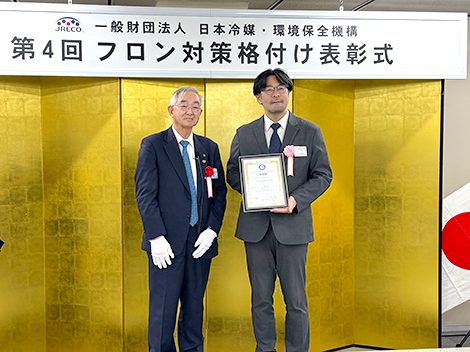
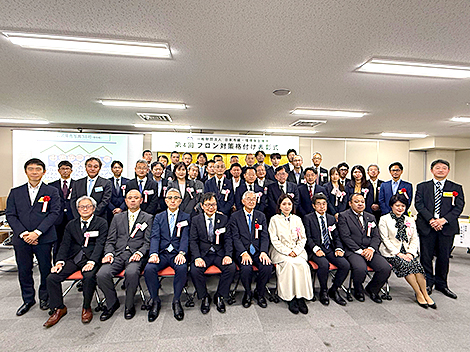
4th JRECO Fluorocarbon Measures Rating Awards Ceremony
Soil Contamination Management
To prevent health hazards caused by soil contamination, Isuzu conducts soil contamination surveys in accordance with the Soil Contamination Countermeasures Law and local regulations when undertaking construction projects of a certain scale or new building developments.
In FY2025, during the construction of the foundation for new equipment in the Fujisawa area, trichloroethylene exceeding the management standards was detected in the soil. Consequently, soil remediation work was conducted and completed in fiscal 2025, in compliance with legal requirements. (Trichloroethylene concentration: 0.022mg/L; Legal standard: 0.01mg/L; Note: There is no groundwater contamination.)
Isuzu will continue to thoroughly investigate contamination conditions and take appropriate measures in all construction activities.
Management of Air Pollutants and Wastewater
At Isuzu's factories, proper management of facilities that emit smoke, such as boilers, is ensured. We verify that air pollutants in exhaust gases, including NOx (nitrogen oxides) and SOx (sulfur oxides), are within regulatory limits.
Additionally, factory wastewater is treated by processing equipment before being discharged into sewers or public water bodies. The discharged water is regularly analyzed to confirm that it meets regulatory standards.
Management Across the Supply Chain
From the previous fiscal year, Isuzu utilizes the self-assessment sheet attached to the Guidelines for the Management of Chemical Substances in Products jointly formulated by the Japan Automobile Manufacturers Association and the Japan Auto Parts Industries Association to exchange information on our partners' management systems and efforts. Through this, we aim to enhance chemicals management throughout the entire supply chain.

